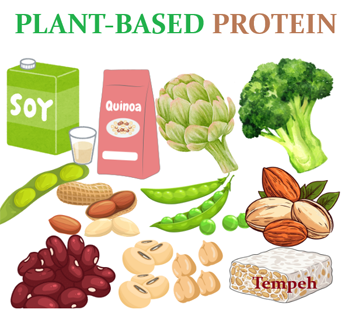Is Plant-Based Protein the Key to a Longer, Stronger Life?
If you want to live a long and healthy life, choosing plant-based protein sources such as beans, nuts, seeds, and grains may be a smarter choice than relying on meat or eggs. Studies show that diets rich in plant protein can support overall wellness, lower the risk of chronic diseases, and even help improve longevity.

This insight comes from a large analysis based on data from the Nurses’ Health Study and the Health Professionals Follow-up Study, which tracked more than 170,000 participants starting in the 1980s. Over a period of 30 years, researchers observed a clear trend.
People who ate more animal protein, especially processed and unprocessed red meat, had a slightly higher risk of death from cardiovascular disease and other causes. On the other hand, those who consumed more plant protein enjoyed better cardiovascular health, lower cholesterol levels, and a slightly reduced risk of dying during the study period.
What is Protein?
Protein is a vital nutrient found in muscles, bones, skin, hair, and other tissues. Proteins are made of 20 amino acids—11 are nonessential (made by the body), while 9 are essential (must come from food). Foods with all nine essential amino acids are called complete proteins, such as quinoa, and soy.
Many plant-based proteins are incomplete, but eating a mix of grains, beans, nuts, and seeds throughout the day can provide all the amino acids your body needs.
How Plant-Based Protein Supports Better Health?
Plant-based proteins are naturally packed with key nutrients that offer multiple health benefits:
-
✅ Rich in dietary fiber – Supports healthy digestion and promotes a balanced gut microbiome.
-
✅ Loaded with antioxidants – Protects cells from oxidative stress and reduces inflammation.
-
✅ Better sugar control – Helps regulate blood sugar levels, reducing the risk of type 2 diabetes.
-
✅ Supports brain health – Linked to less cognitive decline and improved mental clarity with age.
Adopting plant-forward eating patterns like the Mediterranean diet, which emphasizes whole grains, legumes, nuts, and seeds, offers additional advantages:
-
✅ Improves heart health – Reduces the risk of cardiovascular diseases.
-
✅ Supports healthy cholesterol levels – Naturally lowers LDL cholesterol.
-
✅ Promotes longevity – Contributes to a longer, healthier life.
-
✅ Better for the planet – Reduces the carbon footprint and promotes a healthier planet, healthier people approach.
Best Plant-Based Complete Protein Sources
Contrary to common myths, you can meet your protein needs without meat. Many plant foods contain complete proteins, meaning they provide all nine essential amino acids your body requires:
-
Hemp seeds – A nutrient-dense seed that offers omega-3s and protein.
-
Quinoa – A versatile grain that’s naturally gluten-free and rich in amino acids.
-
Seitan – A high-protein wheat product, great for savory dishes.
-
Amaranth – A fiber-rich pseudo-grain with a nutty flavor.
Soy products also shine as complete protein sources:
-
Tofu – Perfect for stir-fries, soups, or even smoothies.
-
Tempeh – A fermented soy product rich in protein and probiotics.
-
Textured Vegetable Protein (TVP) – Ideal for meat substitutes in recipes.
-
Edamame – A fresh, protein-rich snack or salad topping.
-
Soy milk – A creamy, plant-based alternative to dairy that is protein-packed.
Keynote
Adding more plant protein to your meals is simple, cost-effective, and sustainable. Whether it’s a quinoa salad for lunch or a tofu stir-fry for dinner, every plant-forward choice supports better heart health, improved cholesterol levels, and a more vibrant, active life.
Switching to plant-based protein not only supports a longer, healthier life but also benefits the planet. Medical Disclaimer.
Read further on:
≺≺ Which food is most associated with helping people live longer?
≺≺ What grains have the lowest glycemic index?
≺≺ How Important Is Protein for Your Health?
≺≺ is your kid getting too much protein?
≺≺ What foods and vitamins are good for your skin?
≺≺ EWG’s- The Clean Fifteen: Fruits and Vegetables with the Lowest Pesticide Levels.
≺≺ What Is the Ketogenic Diet? Is the Keto Diet Right for Everyone?
≺≺ How important is fiber in the diet?
≺≺ What cardiovascular benefits do berries provide?
≺≺ What is the Okinawan diet? What is the secret behind Okinawan long life-expectancy?
≺≺ Ultra-Processed Foods: What They Are, Why They’re Harmful, and How to Cut Back.
≺≺ What eating strategies work best for losing weight long term?
≺≺ How Do Sugary Meals and Beverages Harm Dental Health?
≺≺ Why Vitamin B12 Is Important for Your Health?
≺≺ What foods should people with high blood pressure avoid?
≺≺ What are the top three minerals you can take to boost memory?
≺≺ Why is regular table salt considered unhealthy?
≺≺ What food is most effective for moderating blood sugar?
≺≺ What are antioxidants? How antioxidants in the fruits and vegetables help in preventing cancers and diseases?
≺≺ How can I reduce the risk of cancer-causing chemicals when cooking or grilling meat?
≺≺ What happens to my blood vessels when I gain weight?
≻≻ Watch this page for more such informative articles on Health, Nutrition, and Wellness.
≻≻-Back to Home page.
Further reading (External Links opens in new window):
≺≺- Colorado State University -College of Health and Human Sciences – Plant-based protein – A simple guide to getting enough.
≺≺- Harvard Health Publishing – Planning a plant-based diet.

